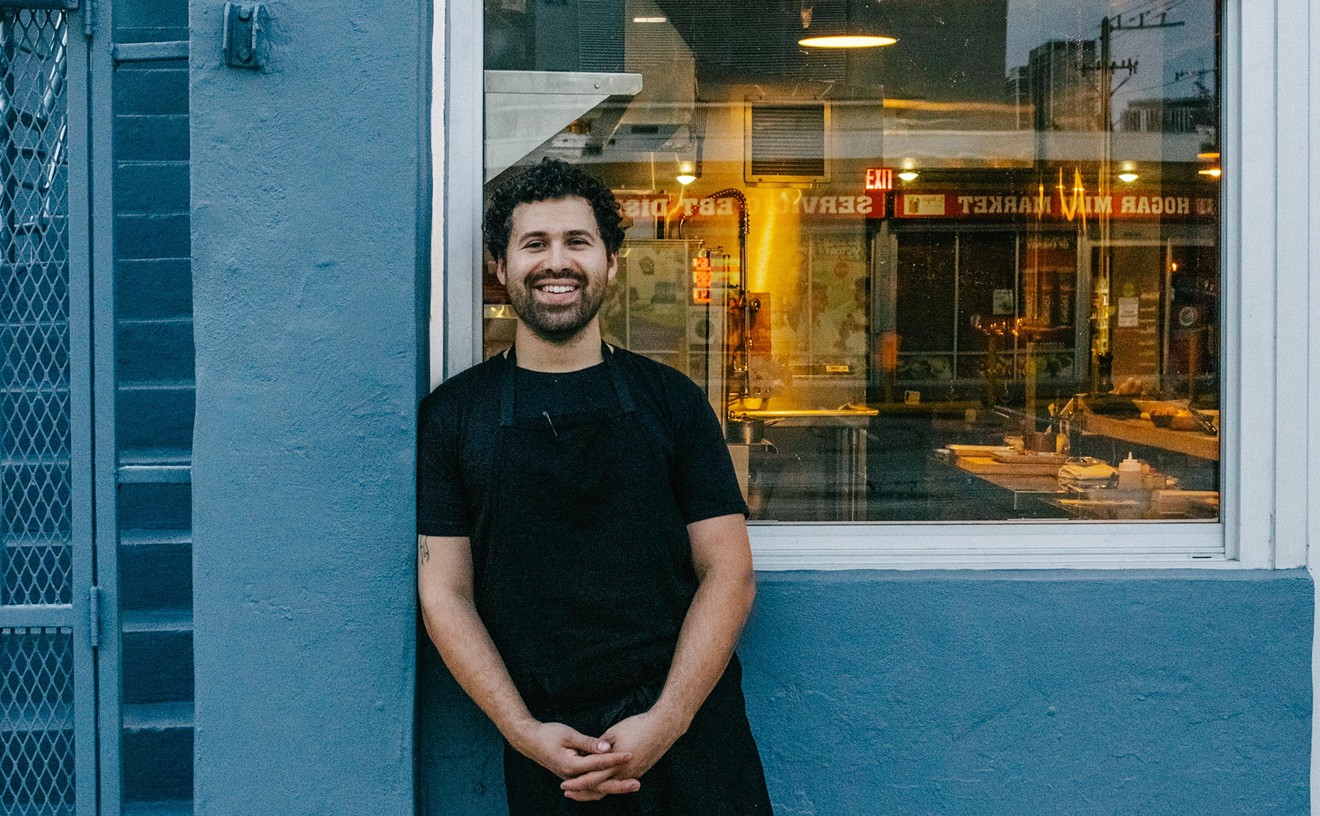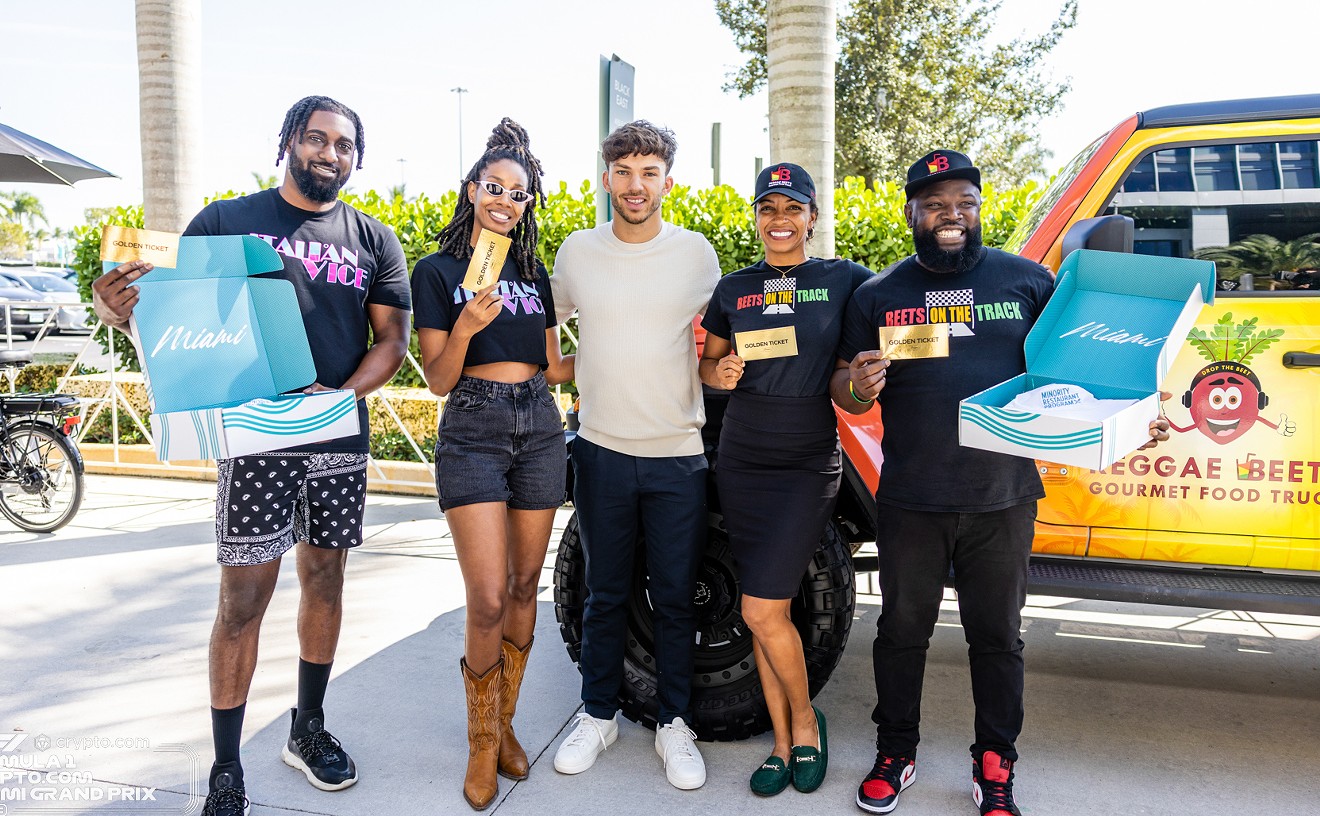Before daybreak, Hialeah's streets are dark and quiet, lit up only by blinking traffic lights and the fleeting gleam of truck headlamps. But from within an unmarked building wafts a faint, uncanny sound. Though it seems unlikely, it's real: Taylor Swift is trilling about never, ever getting back together. And even more surprising, the noise is emanating from Miami's best bakery.
Zak Stern, the man behind the loaves, loves Taylor Swift. It's a funny thing, considering he isn't 13 and doesn't own bright-red Keds. Standing nearly six feet tall, he has a thick, bushy beard and gentle caramel eyes. There's never a moment when he's not wearing a fedora or well-worn boots dusted with flour. And although he looks like a member of Mumford & Sons, he's actually the most talented breadmaker in town.
Hanging on a wall in the cramped, narrow workspace he rents from a local caterer, above a steel rack lined with sourdough loaves, is a small photo of Swift giving a thumbs-up. "GREAT WORK!" it screams in all caps. Stern looks at this photo often — and when he does, he laughs.
Zak the Baker, as he has come to be known, works here while the rest of Miami sleeps, from 8 p.m. until about 11 a.m. He's usually a whiskey and old-time folk music kind of guy, but during this graveyard shift, he listens to pop music to stay awake. "You get really delirious in the middle of the night," he says.
By day, he doesn't work alone. Beside him is his wife, Batsheva Wulfsohn, a petite, spirited woman who moved to Miami from the West Bank after meeting Stern in Israel. She is beautiful, her bronze hair hidden beneath a vibrant turban.
There are also Stern's apprentices, known as WWOOFers — volunteers of Worldwide Opportunities on Organic Farms. They travel the globe exchanging labor for room and board. On a recent morning, an American girl and a kid from Jerusalem make two things very clear: Tahini makes everything taste better, and the success of a workday should always be measured in coffee breaks.
Together, they bake sourdough loaves that are a deep golden-amber hue. The crusts are sturdy, complex, and chewy. Within this shell, the interior has an intense flavor that's acidic, pure, and clean. "We've gotten used to tasting the things that people put into bread — like sugar, milk, or Asiago cheese melted on top. Here, the only thing you're tasting is wheat," Stern explains.
He talks about his bread the way Swift croons a love song, mashing some seriousness with starry-eyed charm. And indeed, much of Stern's life has been driven by romantic ideals. He grew up in a nice Jewish home in Pinecrest and enrolled at Mercer University's pharmacy school in Georgia. There, while studying the aging of the male prostate, he plunged into a deep existential crisis. He saw the prostate as a symbol of youth, which was wasting away in college.
Stern dropped out of school, climbed into a 1970s biodiesel Mercedes-Benz, and embarked on a five-year journey as a migrant organic farmer that took him from Homestead to India, Sweden, France, Israel, and Italy. He dedicated himself to learning craftwork — how to grow vegetables, make goat cheese, and bake sourdough bread. He yearned for wholesomeness, a return to tradition and artistry.
By 2011, though, he had broken up with his then-girlfriend and was faced with a choice: start earning money in Miami or begin a three-year woodwork apprenticeship in Germany. "I didn't have a grand vision of opening a bakery. I needed to make some money, and all I knew how to do was bake bread and raise goats," he says.
So he moved back home and began making 30 loaves of sourdough bread per day by employing the traditional baking methods he'd learned in Europe. He started selling his loaves to Perricone's in Brickell, and with owner Steven Perricone's encouragement, he took samples to James Beard Award-winning chef Michelle Bernstein. After trying his sourdough, she asked Stern to provide bread for her restaurant Michy's.
Working relentlessly and making everything by hand, Stern increased his output to 70 loaves per day.
Eventually, he rented his tiny nook in Hialeah, where he works six days a week and produces up to 280 loaves per day. Now he provides bread to the best restaurants and markets in the city. His sandwiches, stuffed with hummus, avocado, sprouts, and goat cheese, are sold at Panther Coffee. His sourdough is sliced and served with charcuterie at Oak Tavern.
His success is rooted in quality. Sourdough bread gets its acidic tang from a pre-ferment, a mixture of flour and water with naturally occurring bacteria and yeast. As this pre-ferment — or "mother" — ages, its flavor becomes more intricate.
Stern started his mother five years ago in Israel. He packed it in a tiny bottle and took it everywhere he went. Now it's in every loaf he makes.
At his Hialeah bakery, he replenishes his mother nightly by feeding it water and flour. In the morning, he combines a piece of the mother with more than 25 kilos of water, flour, and grains, dried fruits, or nuts per batch. His wife stirs the dense mixture by hand and then pours it into a plastic box. There, the dough ferments for a few hours. Soon enough, the shaping begins. Stern forms the dough into small, taut rounds and allows them to rise. The balls are then shaped again — this time into orbs called boules or football-like shapes called batards.
"All of these things that we do are about making a sticky dough into a well-shaped loaf. It's not a mechanical process. Every day you have to adjust it depending on the temperature, the rise, the environment, everything," he explains.
Some days, Stern must add more flour or water or allow extra time for fermentation. It takes years for bakers to acquire this skill: They must recognize their dough's volatility and adapt accordingly.
To finish the process, he marks his rounds with incisions that distinguish each variety: sesame, Jewish rye, plum fennel and rye, olive and za'atar, sunflower, whole wheat, or walnut and cranberry. His oven has a broken stone at the moment, so he can bake only 22 loaves per hour.
This year, his circumstances will change. In April, the bakery will move into a large retail space at NW 26th Street and NW Third Avenue in Wynwood. Stern will own his first mixer and, most important, an oven that can bake up to 140 loaves an hour. It'll be a certified kosher bakery, serving bread, pastries, soups, and salads. But with that label come challenges: To maintain this certification, Stern must sell only dairy and fish — no meat. He'll have to sell his business to a non-Jewish partner Saturdays and then buy it back Sundays.
Zak the Baker will be the only bakery of its kind in Miami. But that doesn't mean Stern won't have any more time for Taylor Swift: "We try not to take things too seriously. I mean, at the end of the day, it is just bread."









